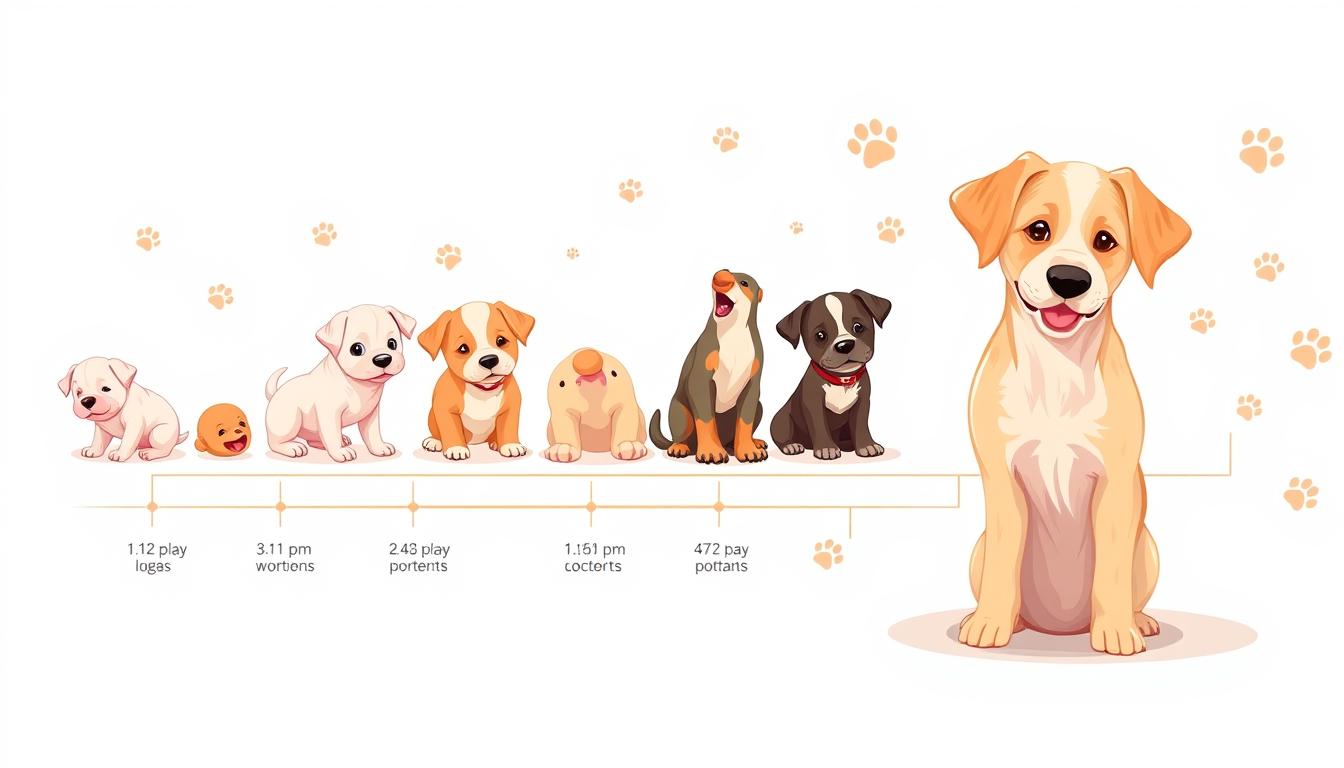Puppy Stages: What To Expect In Your Dog’S Growth
Published October 18, 2024 Articles

Bringing home a new puppy is exciting and rewarding. It’s a journey filled with rapid changes and unique challenges. Understanding the key puppy stages and milestones helps you care for and train your puppy.
In the early days, your puppy will go through a whirlwind of growth. From the neonatal stage to the socialization period, each phase brings new joys and considerations. Knowing these stages helps you meet your pup’s needs for a lifetime of health and happiness.
Key Takeaways
- Puppies experience rapid physical, cognitive, and social development from birth to 18 months
- Understanding key puppy stages, like the neonatal, transitional, and socialization periods, can help owners provide the best care
- Proper socialization, training, and meeting developmental needs during the first 12 weeks are crucial for a well-adjusted adult dog
- Puppies go through “fear periods” and adolescent phases that require patience and consistent guidance
- Staying informed on your puppy’s growth timeline and needs can make the journey of raising a pup more rewarding
Early Puppy Development: Birth to 8 Weeks
Socialization Period: 3 – 12 Weeks
In the first few weeks, puppies rely heavily on their mother. They have limited senses and can’t move much. But by 2-4 weeks, their senses start to develop. They begin to play with their siblings and explore their world.
This is a crucial time for social learning, from 3 to 12 weeks. Puppies learn important social skills. They should meet new people, animals, and experiences in a positive way.
Bringing a puppy home between 8-12 weeks helps them adjust. It’s a key time for social learning. It’s important to introduce them to new things slowly and gently.
- Most puppies open their eyes between 10 and 14 days old.
- Puppies start to walk with a wobbly gait around 18 to 21 days of age.
- Puppies develop the ability to urinate and defecate on their own around 3 to 4 weeks of age.
- Baby teeth start to come in between 3 and 4 weeks of age.
- Puppies are fully weaned between 5 and 8 weeks of age.
It’s vital to provide good health care, grooming, and nutrition during this time. This ensures your puppy’s well-being and supports their growth. With patience and the right approach, your puppy can thrive and become a loving companion.
“Introducing puppies to various stimuli gradually and below the fear threshold is essential in their early stages for proper socialization.”
Puppy Stages What to expect
Fear Periods
As your puppy grows, they will go through many changes. Between 4-6 months and 14-18 months, they may suddenly become scared of things they used to like. Proper socialization and a calm, patient approach from you as the owner can help your puppy overcome these fear periods.
They may also go through a teething phase around 4-6 months. This can make them chew more, which you’ll need to manage. Knowing these changes helps you guide your puppy through this important time.
| Puppy Behavior Changes | Timeframe |
|---|---|
| Fear Periods | 4-6 months, 14-18 months |
| Teething | 4-6 months |
With patience, positive reinforcement, and proper socialization, you can help your puppy through these changes. Stay consistent and enjoy watching your furry friend grow into a well-adjusted dog.

“Proper socialization and a calm, patient approach from owners can help puppies overcome these fear periods.”
Adolescent and Adult Dog Development
As your puppy grows, you’ll see many changes. Knowing about each stage’s challenges and chances helps you care for your dog.
Testing Period: 3 – 6 Months
Puppies from 3 to 6 months start to show their independence. They try to figure out their place in the family. It’s important to keep up with puppy training and socialization during this time.
Adolescence: 6 – 18 Months
The teenage years for dogs last from 6 months to 18 months. They have lots of energy, mood swings, and test boundaries. Keeping up with puppy training and giving them lots to do and exercise is key.
- Teenage dogs may not listen as well because of hormones. But they love to explore, play, and run.
- Structured play and exercise help manage their energy.
- Meeting their physical and behavioral needs is vital to avoid bad behavior.
Knowing about puppy training stages and the puppy adolescence phase helps your dog grow well. Consistent training, lots of exercise, and patience are essential during this time.
Conclusion
Raising a puppy is a rewarding but demanding journey. Understanding your puppy’s growth timeline helps you care for them. This way, your puppy can grow into a happy, healthy, and well-adjusted companion.
Each stage of your puppy’s development needs your attention and commitment. Knowing your puppy’s needs by age is key. This includes proper nutrition, exercise, and health considerations.
By staying informed and committed, your puppy will grow into a loyal and affectionate companion. Remember, a well-cared-for puppy is more likely to grow into a loyal, confident, and affectionate canine companion.
Your puppy’s growth and well-being is a journey filled with challenges and joys. Embracing this process with patience, love, and the best care is crucial. This way, your puppy can thrive and become the beloved family member you’ve always dreamed of.
The rewards of raising a happy, healthy dog are truly priceless. It’s a journey that brings joy and fulfillment to your life.
FAQ
What are the key developmental stages a puppy goes through?
When does the critical socialization period occur for puppies?
What happens during the “fear periods” in a puppy’s development?
What challenges do owners face during the “testing period” and “adolescence” in a puppy’s development?
How can owners best support their puppy’s development through all the stages?
(Article Last Updated on October 20, 2024)
